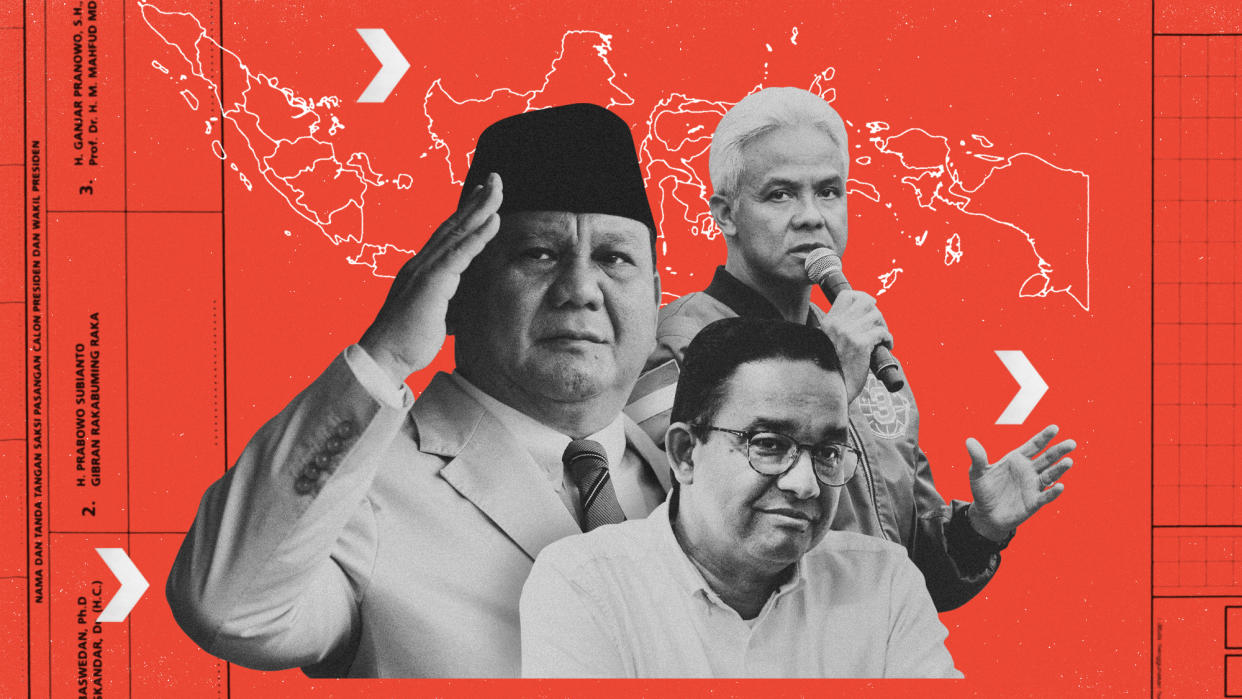Where does Indonesian democracy go from here?

- Oops!Something went wrong.Please try again later.
The American electoral system can be a complex, labyrinthine process with a dizzying panoply of moving parts at the local, state, and federal levels, but it pales in comparison to the gargantuan enterprise that is Indonesia's sprawling single-day election operation. This year, some 200 million voters registered to elect a new Indonesian president, as well as thousands of other candidates for various regional counsels, local parliaments, and the country's House of Representatives — all spread across the 6,000 some populated islands that make up the world's third-largest democracy. It's a staggeringly intricate process supervised entirely by the Komisi Pemilihan Umum, Indonesia's election commission, which is tasked with everything from "procuring polling station equipment to managing a huge election staff to ensuring the public trusts the integrity and fairness of the vote," said The Conversation.
While the official results of this week's elections are expected to take several weeks to fully tabulate, former general and Indonesian political fixture Prabowo Subianto wasted little time declaring victory in the three-way presidential race, citing unofficial poll counts that put him well over 50% shortly after polls closed on Wednesday. Although neither of his challengers has conceded, Prabowo — who lost his previous runs for the presidency — pledged to "nurture, protect and defend all the people of Indonesia, regardless of tribe, ethnic group, race and religion and social background" during a victory speech in Jakarta, the nation's capital.
Decisive as Prabowo's victory may seem, it also represents an ominous turning point for Indonesia, which has enjoyed two decades of relative freedom since ousting longtime dictator Muhammad Suharto in 1998.
What did the commentators say?
Prabowo is a "wealthy former military man with close ties to the current government" as well as a "controversial figure" due to his relationship with his then-father-in-law Suharto and his regime, said CBS News. He was previously banned from entry into the United States after being accused of "military crimes in places like East Timor" such as allegations that he'd "instigated riots that killed hundreds" in the aftermath of Suharto's ousting, Reuters said. That ban was lifted in 2020. During his time in the military, Prabowo served as "special forces commander in a unit linked to torture and disappearances," but "vehemently denies" any wrongdoing, said The Associated Press.
For as much as his "image as a strongman has served him well" throughout his career in Indonesian politics, Prabowo's apparent success on Wednesday is in no small part the result of a "social media rebranding campaign featuring his beloved felines, a cherubic AI avatar, and TikTok dances" designed to appeal to younger voters, Time said.
Cuddly image aside, the freedoms of Indonesia's post-dictator era "could now be under threat" by Prabowo's ascendency to a position he's coveted for decades, The New York Times said. In part, that ascendency is the result of "the implicit support of the popular outgoing president," Joko Widodo, under whom "democratic norms in Indonesia have eroded." He reportedly played a "crucial role in the rehabilitation" of Prabowo's public image. Joko also happens to be the father of Prabowo's running mate, Gibran Rakabuming Raka.
What next?
Prabowo has "previously advocated for removing presidential term limits, ending direct presidential elections and curtailing human rights protections," which raises concerns that his presidency could mark a step backward for Indonesia's nascent democracy, Laura Schwartz, intelligence agency Verisk Maplecroft's senior South East Asia analyst, said to CNN. This, in turn, would "dent Indonesia's reputation and its ability to attract foreign investment." Voters also told the network that Prabowo and his connections to Joko could mark a return to undemocratic "dynasty politics."
Prabowo will likely continue "what's been the foreign policy norm" for Indonesia, Ian Wilson, senior lecturer at Murdoch University's Indo-Pacific Research Centre, said to Al Jazeera. In particular, that means maintaining Indonesia's "non-aligned approach to the region," where China and the United States jockey for influence.
Ultimately, Prabowo likely won't allow his predecessor "to carry too much influence," Verve Research executive director Natalie Sambhi told The New York Times. But, she added, "if Prabowo starts to steer Indonesia in a different direction" from the path Joko had established over his time in office, "what will happen?"

